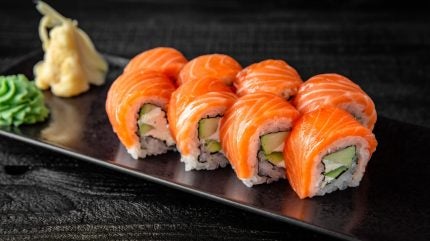
The US Food and Drug Administration (FDA) has cleared cell-based seafood company Wildtype to market products, marking a first for the sector.
The agency issued a “no questions” letter following a pre-market consultation, confirming its agreement with the San-Francisco-based company’s assessment that its cultivated salmon is “safe” for consumption.

Discover B2B Marketing That Performs
Combine business intelligence and editorial excellence to reach engaged professionals across 36 leading media platforms.
Wildtype’s production process begins with the procurement of source cells from fry-stage coho salmon (Oncorhynchus kisutch) raised in a hatchery in Washington state.
The viable cells are proliferated in stainless steel bioreactors using Wildtype’s “proprietary” nutrient blend.
The harvested cells are then seeded onto plant-based scaffolds and go through rinsing, quality checks and conventional food processing and packaging.
The FDA noted Wildtype had provided a summary of its safety assessment covering the years 2022 to 2025.

US Tariffs are shifting - will you react or anticipate?
Don’t let policy changes catch you off guard. Stay proactive with real-time data and expert analysis.
By GlobalDataIn its letter, the agency said: “Based on the safety assessment Wildtype has conducted, it is our understanding that Wildtype has concluded that foods comprised of or containing the cultured cellular material resulting from the production process defined in CCC 000005 are as safe as comparable foods produced by other methods and would not contain substances that adulterate the food.”
Wildtype has introduced its cultivated salmon at Kann, a restaurant in Portland, Oregon.
In a blog post, the company said the weekly service of the product began in late May, with availability expanding to every Thursday night in June and daily service planned from July.
Wildtype also intends to roll out its product in four additional restaurants over the next four months.
In 2022, Wildtype raised $100m in a Series B funding round with US agribusiness giant Cargill among the investors that participated in the round.
Two years ago, the US cleared cultivated-chicken from locally-based Upside Foods and Good Meat for sale. Earlier this year, Mission Barns, a company developing animal fat in bioreactors, was also given the green light.





